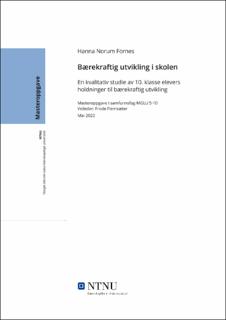| dc.contributor.advisor | Flemsæter, Frode | |
| dc.contributor.author | Fornes, Hanna Norum | |
| dc.date.accessioned | 2022-07-16T17:23:31Z | |
| dc.date.available | 2022-07-16T17:23:31Z | |
| dc.date.issued | 2022 | |
| dc.identifier | no.ntnu:inspera:110859567:37773083 | |
| dc.identifier.uri | https://hdl.handle.net/11250/3006298 | |
| dc.description.abstract | Denne kvalitative studien ser på 10. klasse elevers kunnskaper, holdninger og tanker rundt bærekraftig utvikling. Elevene i studien består av det første kullet som går ut av ungdomsskolen hvor LK20 er blitt tatt i bruk. Datamaterialet til studiet er samlet inn ved bruk av fokusgrupper på to ulike skoler, fra to ulike industrikommuner. Målet med studien har vært å se på hvilke holdninger og kunnskaper elevene sitter med, og hvordan dette påvirker deres syn på industrikommunene de bor i.
Studien viser at elevene fra de to ulike skolene har tilegnet seg kunnskap om bærekraftig utvikling i varierende grad, men at alle elevene mangler kompetanse for handling. De har ikke kjennskap til hvordan de kan bidra til en bærekraftig utvikling, og peker på at de som 15 og 16 åringer er for unge til å kunne bidra på nåværende tidspunkt. Selv om de hevder de er for unge til å kunne ta del i bærekraftig utvikling, påpeker de at utdanning for bærekraftig utvikling er viktig. Som de selv sier, det er jo tross alt de som skal ta over denne ødelagte verden. Et annet interessant funn gjort i studien, er elevenes bekymringer for industrikommunenes fremtid. Her hevder den ene skolen at kommunen kommer til å bli en sentralisert bykommune, med gjengrodde bygder, mens elevene på den andre skolen frykter at teknologi snart vil ta over mange arbeidsplasser. | |
| dc.description.abstract | The knowledge, attitudes, and thoughts of 10th grade students about sustainable development are examined in this qualitative study. For the past two years, Kunnskapsløftet (LK20) has been utilized in Norwegian schools, and the kids in this study have used it as well. The kids are the first to graduate from an upper secondary school that has implemented LK20. The study's data was gathered through focusgroups, which are a type of group interview comprised of students from two different schools in two different industrial municipalities. The purpose of this study was to see what attitudes and knowledge kids in 10th grade had, and how this influences their perceptions of the industrial cities in which they live.
According to the findings, students from the two institutions have learned varying levels of knowledge about sustainable development, but they all lack the ability to act. They lack understanding about how they can contribute to a sustainable development and argue that they are too young to make a difference right now as 15 and 16-year-old humans. Despite the fact that they think they are too young to participate in sustainable development, they emphasize the importance of sustainable development education. As they say, those are the ones who will rule this damaged globe. The students' concerns regarding the future of industrial municipalities is another fascinating finding from the survey. Students at one school believe the municipality would become a centralized urban municipality with overgrown settlements, whereas students at the other school are concerned about technology and believe it will eliminate many jobs. | |
| dc.language | nob | |
| dc.publisher | NTNU | |
| dc.title | Bærekraftig utvikling i skolen | |
| dc.type | Master thesis | |
